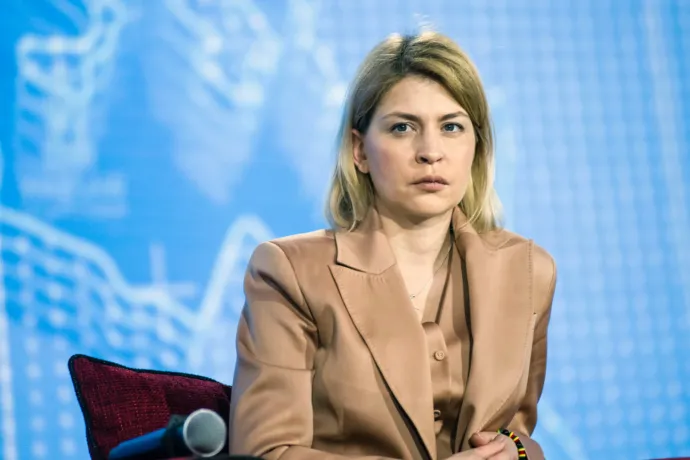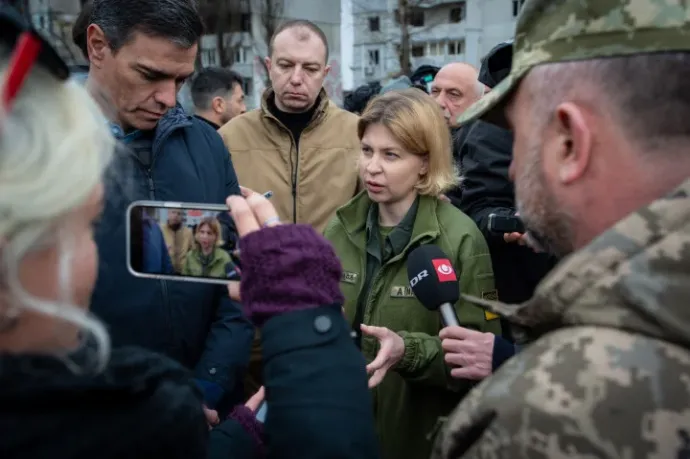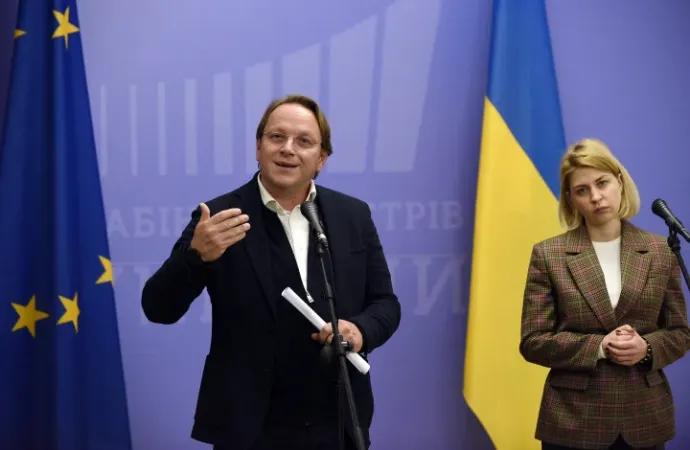
The goal was to make Ukraine's Euro-Atlantic integration impossible, but the war unleashed by Russia accelerated it instead. Once the war ends, NATO membership is a realistic prospect for the country, but Kyiv believes that a fundamental reassessment of the European security system is needed in light of Russia’s aggression. With the candidate status – which Hungary has also voted in favour of – Ukraine has entered a new stage in its quest for EU membership. The Hungarian government's policy towards Russia is perceived in Kyiv as short-sighted, but they see a shift happening, and do not claim that Hungary is explicitly blocking Ukraine's accession to NATO. They do, however, maintain that cooperation would have been faster without meetings at the highest level being blocked. Ukraine's deputy prime minister for Euro-Atlantic integration, Olga Stefanishyna gave Telex an online interview.
With the Russian offensive launched on 24 February, the war going on in Ukraine is the kind that has not been seen since the Second World War. "This makes it essential to review the system that has so far secured peace, based on the UN Charter and the existence of NATO," Olga Stefanishyna said.
According to Ukraine’s Deputy Prime Minister for Euro-Atlantic Integration, the outcome of this review could be her country’s membership in NATO, which is a firm objective of Ukraine, as is EU membership.
However, the process did not start at the time of the February invasion: it gained momentum in 2014, after Russia annexed Crimea and the separatist areas in eastern Ukraine were created with its armed support. Euro-Atlantic integration, including NATO membership, was included in the Ukrainian constitution as a strategic goal in 2018.
Olga Stefanishyna was born in Odessa in 1985. She graduated as a lawyer and, after a short period of private practice, joined the Ministry of Justice, where her career took off quickly: at the age of 25 she was already deputy head of the Ministry's international law and Euro-Atlantic integration department, and soon afterwards became its top official. This happened during the presidency of Victor Janukovich. After the departure of the president, who fled to Russia after bloody clashes in Majdan in 2014, she worked in the Euro-Atlantic Integration Department of the Prime Minister's Office.
She is a member of the policy council of President Volodimir Zelensky's party, which won the elections in 2019. In 2020, she reached the pinnacle of her career so far by becoming Ukraine's Deputy Prime Minister for Euro-Atlantic Integration and then a member of the country's National Security Council.
There is still work to do before the thirty approving votes
"There is consensus among the 30 NATO members that the conditions for the continent's security have changed. If the peaceful coexistence between the countries of the region is to be ensured, we need to rethink the process" Stefanishyna said, stressing that the benefits of NATO membership are mutual.
“The experience that we are gaining now (fighting Russia) is unprecedented in 75 years, unprecedented since the existence of NATO.”
This capability could also strengthen NATO. Ukraine's president, Volodymyr Zelensky submitted Ukraine's application for membership in September, proposing a fast-track procedure. (This could mean that, in contrast to the previous enlargement which included countries in Central and Eastern Europe, Ukraine would gain membership without a membership action plan, as is expected to happen with Finland and Sweden.)
However, no precise date can be predicted. "After the war, Ukraine will regain its territories and become a member of NATO as an independent country," Stefanishyna says, indicating two important things: Ukraine's membership aspiration is a settled fact for the country, as well as the fact that it will not happen during the war.
But that does not mean that the process will stop in the meantime: "In Ukraine, we are doing our utmost even during the war. We are preparing so that when the war is over, the country will be ready for membership to the point where, once the opportunity to join arises, there will be nothing left except for making the political decision" – that is, to have all NATO members legally approve accession.
Therefore, Ukraine's goal is to become a "de facto member of NATO as soon as possible and a de jure member as soon as political circumstances allow", Stefanishyna clarified.
Ukraine's military and social reforms over the past eight years have served this purpose as well, and have also contributed to a much greater defensive capability than in 2014, when Russia was able to occupy Crimea and establish the "people's republics" of Donetsk and Luhansk without fighting, using its military, and the relatively limited covert military support of the separatists in eastern Ukraine.
In September this year, in violation of international law, and citing the referendum which lacked transparency and the option of a genuine choice, Russia annexed the areas, along with the provinces of Kherson and Zaporizhzhya (with almost all of Luhansk province being Russian-controlled, and only the eastern half of Donetsk and Kherson and the southern half of Zaporizhzhya being under their control).
Things which were impossible eight months ago became possible
Ukraine's ability to fight back has also fundamentally changed Western attitudes. "The dynamics of the past eight months of war show that traditional assumptions and answers to traditional questions no longer apply. You will recall that during the first months of war we did not even go to our democratic allies to ask for an airlock to save our people." (Although Zelensky did speak about the need to do so several times in March.)

"At that time it seemed impossible to work out a format with our allies through which they could help provide us with airspace protection. However, in light of the past eight months' resistance, the issue is at a higher level: we are now talking at a practical level about how to strengthen Ukraine's air defences" – NATO arms deliveries have already played a key role in Ukraine's resistance, and the further strengthening of air defences could contribute to this, although it will not be an easy task.
In Kyiv, they stress the basic point that a lot has already been accomplished in practice in regards to the integration. The country is "in fact already integrated into NATO policy. My office also regularly issues information on how this works in practice in Ukraine." According to Stefanishyna, "Russia has provoked a new situation which has opened the way to our NATO membership".
What the end of the war means is not a question, according to her: "We have made it clear that our ultimate goal is to regain the territory of the country within our internationally recognised borders. NATO has recognised this principle." Until accession is achieved, Kyiv envisages intermediate solutions:
“Cooperation with NATO is ongoing. It is important to discuss with our allies, one by one, what guarantees they can give Ukraine to prevent the possibility of another attack after the war.”
In the process leading up to membership, "we are open to all forms of arrangement" in order to achieve meaningful security. In a previous interview with us, this was also confirmed by the Ukrainian President's advisor, Mykhailo Podolyak, who foresaw the possibility of bilateral guarantee agreements with countries able and willing to provide safeguards to protect Ukraine.
Hungary is slowing things down, but it's not obstructing
For Euro-Atlantic integration to succeed, the agreement of EU and NATO members is essential. As a member of these organisations, Hungary plays a key role in this. At the same time, the Hungarian government has expressed a number of reservations, sometimes about Ukraine's responsibility in the conflict, at times criticising NATO's arms transfers – saying that they only prolong the war – and criticising the "Brussels sanctions" against Russia, which Hungary also voted in favor of.
The Hungarian government is walking its own path when it comes to statements and in some cases at the level of the scope of the sanctions as well: for example it initiated the removal of Patriarch Kirill, the head of the Russian Church from the scope of the EU's restrictive measures against him. This is also plainly visible from Kyiv, as is the fact that even before the Russian invasion on 24 February, Hungary was blocking meetings between NATO and Ukraine at the highest level – although not at the lower level.
"I am not saying that the attitude of the Hungarian government is in itself an obstacle to our accession to NATO. However, Hungary has a long history of blocking dialogue with NATO at the highest level. It is of course true that many elements of technical and expert cooperation would have been achieved faster if there had been no blocking at that level. This is a fact, and no one can deny that meetings at the highest level would add a lot to this cooperation and would provide a clearer picture, thus avoiding certain manipulations, the traces of which we have seen in many capitals," Stefanishyna said, referring to the effectiveness of Russia's information policy in some countries.
So Hungary is not an obstacle to Ukraine's NATO membership, but at certain levels it is “an obstacle to the dialogue that is generally about cooperation between allies and a deeper integration.”
Hungary is playing for short-term gains
The Hungarian government's policy towards Russia is rather short-sighted, according to Stefanishyna. " In the short term, Hungary may gain certain advantages, for example in energy policy, but in the longer term I don't think their strategy is a good one." Stefanishyna also doubts that the tension between Budapest and Kyiv would benefit Hungary, and she adds that there are signs that Budapest sees it the same way too. There have been statements that show a change in the government's rhetoric.
When asked about Viktor Orbán's comparison between Ukraine and the Hungarian Revolution of 1956, and between Volodymyr Zelensky and Imre Nagy, the Ukrainian Deputy Prime Minister said:
"This shows that Hungary shares many common values with Ukraine. Both countries suffered at the hands of totalitarian regimes. I think this is a good sign. Thus maintaining European security is in the common interest of the Hungarian and Ukrainian people."
Ukraine's membership in NATO and in the EU is needed for European security and the "maintenance of a European way of life" in Ukraine.
Stefanishyna said the latter was more predictable, although she did not provide a timeframe. Incidentally, Hungary is providing the EU's enlargement commissioner in the person of Olivér Várhelyi, but Stefanishyna doesn’t see this is an obstacle to the process – Hungary also backed Ukraine's candidate status this summer.

"Olivér Várhelyi was here a few weeks ago, and we defined the next steps, and Ukraine indicated that we are ready to move quickly on all practical issues."
As for the disagreement between the Hungarian and Ukrainian governments, it is mainly due to the law on education and language, which Budapest says threatens the education of the Hungarian minority in Transcarpathia in their mother tongue.
“We are now fighting a war. Our cities are under bombardment, part of the population has been forced to flee. Our current goal is survival. But we do not want to present ourselves as mere victims. We believe that our relations will be positive, as they were many years ago.”
She believes Orbán would be welcomed in Kyiv
“There is no alternative but to cooperate with the democratic world. Everything will fall into place in time. After the war is won, when Ukraine regains its territorial integrity and begins to rebuild, then bilateral relations with our neighbours will be good.”
As for the contested laws, “a consensus was already formulated last September on how to solve the problem. There are political criteria for Euro-Atlantic integration, including ensuring the rights of minorities in the spirit of international obligations. We are working on this, I hope this issue will not be over-politicised in the future. I do not think this is the right time to do this.”
There has been no meeting between the leaders of the two countries so far – while leaders of countries in the region have already visited Kyiv and even Bucha, a site of the Russian army's war crimes, which Viktor Orbán has likened to Budapest in 1956.
“I am not authorised to assess the chances of a meeting with the Ukrainian president, but I am sure that if Viktor Orbán were to show willingness for a visit, he would be welcomed in Kyiv.”
For more quick, accurate and impartial news from and about Hungary, subscribe to the Telex English newsletter!